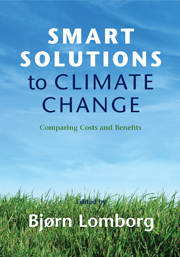9 - Expert Panel Ranking
Published online by Cambridge University Press: 05 June 2012
Summary
The Goal of the Project
The goal of the Copenhagen Consensus on Climate was to evaluate and rank feasible ways to reduce the adverse consequences from global warming.
Individual proposals that would achieve this were examined under the eight solution headings of: Climate Engineering, Carbon Cuts, Forestry, Black Carbon Cuts, Methane Cuts, Adaptation, Energy Technology, and Technology Transfers (TTs).
Ranking the Proposals
A Panel of economic experts, comprising five of the world's most distinguished economists, was invited to consider these proposals and identify the proposals where investments would be most effective. The members were: Jagdish N. Bhagwati of Columbia University, Finn E. Kydland of the University of California, Santa Barbara (Nobel Laureate), Thomas C. Schelling of the University of Maryland (Nobel Laureate), Vernon Smith of Chapman University (Nobel Laureate), and Nancy L. Stokey of the University of Chicago.
The Panel was asked to answer the question:
If the global community wants to spend up to, say, $250 billion per year over the next 10 years to diminish the adverse effects of climate changes, and to do the most good for the world, which solutions would yield the greatest net benefits?
The sum of up to $250 billion per year was chosen by the Copenhagen Consensus Center because it is in the order of magnitude of spending that world leaders could commit to in the Copenhagen COP 15 negotiations, and is consistent with the relevant economic literature on the expected costs of dealing with global warming.
- Type
- Chapter
- Information
- Smart Solutions to Climate ChangeComparing Costs and Benefits, pp. 381 - 394Publisher: Cambridge University PressPrint publication year: 2010



